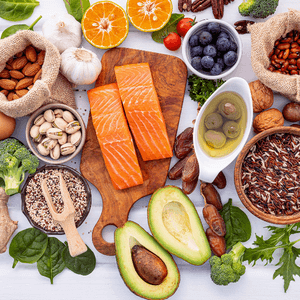3 Key Takeaways
- Underlying chronic inflammation is closely connected to chronic diseases, so it's vital to eat foods that promote inflammation relief.
- Cinnamon is very beneficial for the body thanks to anti-inflammatory, antibacterial, anti-fungal and antiviral properties.
- Ginger is one of the most potent alternatives to pain relief medication because it fights inflammation, treats nausea, and alleviates muscle soreness.
Inflammation is the result of your body fighting against viruses and bacteria. When the white blood cells detect the potential threat, inflammation indicates that you must act and stop the bacteria from wreaking havoc on your health. However, chronic diseases, cause inflammation even though there’s no real threat to fend off. Instead of healing, the immune system’s mistaken reaction will cause damage to the body. That’s why it's vital to modify your diet in a way that it fends off inflammation. Anti-inflammatory diet, such as Mediterranean, that’s rich in fish and a variety of vegetables will help you feel better and fight the inflammation successfully. From whole foods to fatty fish, spices and berries, an array of foods will be your best ally in fighting inflammation.
More Information About the Anti-Inflammatory Diet
The anti-inflammatory diet puts fruits, vegetables, complex carbs, nutrient-dense foods and healthy fats in focus. Underlying chronic inflammation is closely connected to chronic diseases, so it's vital to eat foods that promote inflammation relief.

To offer the body inflammation relief, it's essential to consume red meat, refined grains, and added sugar as little as possible. Ideally, only once a week if you feel the cravings raging. An anti-inflammatory diet , alongside lifestyle changes, can significantly decrease the level of chronic inflammation in your body.
What to Eat on An Anti-Inflammatory Diet
Focus on whole foods
Cutting out processed foods means there will be more room for healthy, whole foods such as oranges, apples, carrots, and similar. If you’re not sure what other whole foods to buy, we suggest enriching your diet with the following:
- Nuts and seeds
- Legumes like dried beans and peas
- Fish
- Brown or wild rice
- Oats
- Eggs
- Chicken/turkey breast
Berries
Berries are chock-full of fibre, vitamins, and minerals that have anti-inflammatory properties. Some of the most common berries are:
- strawberries
- blackberries
- raspberries
- blueberries
Berries contain antioxidants that are packed with anti-inflammatory effects. Those potentially reduce your risk of disease.
Fatty fish
Another type of food that provides inflammation relief is fatty fish. It contains plenty of proteins, and thanks to omega-3 fatty acids, your body will feel much better after making it a regular part of your diet. Further fatty fish are among the best sources of omega-3 acids:
- anchovies
- mackerel
- herring
- sardines
- salmon
EPA and DHA in fatty fish reduce inflammation, preventing conditions like kidney disease and diabetes.
Spices
- Turmeric
Turmeric has quickly become one of the favourite spices for cooks worldwide. Aside from professional chefs, turmeric is used in amateur cooks’ kitchens too. One of the main ingredients in curries, turmeric features a warm, earthy flavour known in Indian dishes. One of the reasons it became so popular is because of the concentration of curcumin it contains. Curcumin is a powerful anti-inflammatory compound that helps reduce inflammation related to arthritis and diabetes.
- Cinnamon
Do you enjoy your coffee with a bit of cinnamon? Have you been adding it to your desserts? Aside from having the most pleasant scent, cinnamon is also very beneficial for the body as it’s known to feature anti-inflammatory, antibacterial, anti-fungal and antiviral properties. Thanks to a high concentration of phenolic compounds it contains, cinnamon will lower the inflammation in your body.
- Ginger
When you need to fight inflammation without the use of painkillers, there comes ginger as one of the most potent alternatives to pain relief medication. Aside from fighting inflammation, ginger is also ideal for treating nausea, and alleviating muscle soreness.
- Broccoli
According to research, broccoli, cauliflower, and other cruciferous vegetables help decrease the risk of heart disease and cancer thanks to the anti-inflammatory effects of the antioxidants they contain. Broccoli contains high levels of sulforaphane. Thanks to that antioxidant, the inflammation in the body decreases because the levels of cytokines and nuclear factor kappa B (NF-κB) go down instantly.
- Avocado
Another superfood to introduce to your anti-inflammatory protocol is avocado. Avocados are packed with heart-healthy monounsaturated fat, fibre, magnesium and potassium. On top of that, they contain carotenoids and tocopherols, which are closely connected to a reduced risk of cancer. So, if you like guacamole, there’s your excuse to indulge in the dip more often than before.
- Peppers
Vitamin C and antioxidants are the most powerful fighters of inflammation. Bell peppers and chilli peppers are chock-full of them, making these two foods ideal for your anti-inflammatory diet. Bell peppers feed your body the antioxidant quercetin, which is known to reduce inflammation associated with chronic diseases like diabetes.
- Mushrooms
We all look for nutritious foods that won't provide us with unnecessary calories. Mushrooms are just the foods to do that while also providing our bodies with vitamins B, copper, and selenium. Shitake mushrooms, portobello mushrooms and truffles contain phenols and other antioxidants that offer the necessary anti-inflammatory protection.
- Grapes
Grapes also promote inflammation relief because they’re packed with anthocyanins. Furthermore, they have the potential to decrease the risk of several diseases, including eye disorders, obesity, diabetes, heart disease, and diabetes. Similar to watermelons, rapes are also a good source of hydration thanks to the amount of water they contain.
- Dark chocolate and cocoa
Don’t worry, anti-inflammatory diet doesn’t stray away from all the sweets. It allows you to indulge in dark chocolate. Packed with antioxidants that help reduce inflammation, dark chocolate will be your guilty pleasure that won't make you feel as guilty for eating it as milk chocolate would. Flavanols found in this treat help slow down ageing alongside fighting inflammation. Go with dark chocolate with at least 70% cocoa, for the most effective protection.
- Cherries
Cherries are delicious whether you eat them fresh or throw them in one of those cheat-day desserts. Rich in antioxidants, cherries help with inflammation relief, whilst making you enjoy your fruit salad the most. Cherry jam or jell will also offer anti-inflammatory properties, but whenever you can, try to have them fresh and washed under cold water to eliminate all the potential germs.
Foods to Avoid when Starting Anti-Inflammatory Diet
After offering numerous examples of foods you should eat, we cannot miss out on pointing out foods that will inevitably cause inflammation. Knowing what foods to avoid is equally important as knowing which foods to eat more. Steer clear of anything that comes in a box or a bag, is pre-made and ready to bake in the oven after only unwrapping it.
Examples include:
- Fried chicken and French fries alongside any other fried food
- Sugary drinks
- Processed cheese and byproducts
- Processed meats, such as salami, pepperoni, bologna, hot dogs and bacon
- Sweets, including pre-packaged desserts, ice cream and candy.
- Snack foods, like potato chips
Final Thoughts
Inflammation may occur in your body without sending clear signals it's there. In case you know you're suffering from chronic inflammation, it's time you began a new diet. Enriching your diet with the foods listed above will offer a healthier lifestyle while making you enjoy your life the most. All it takes to prevent severe health conditions is a discipline that starts with your healthy anti-inflammatory diet.






